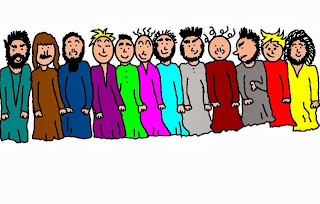My first memories of Christmas had nothing to do with presents or trees, we had none of either. Instead it is the memory of an enormous nativity pageant running across a park in Karachi, Pakistan, with real camels and real hills and a star which ran on an invisible wire across the sky, and most of all the hauntingly beautiful and worshipful words of "O Holy Night" urging us to fall on our knees and worship.....
Oh holy night, the stars are brightly shining
It is the night of our dear Savior's birth
Long lay the world in sin and error pining
Till He appeared and the soul felt His worth
A thrill of hope, the weary world rejoices
Yonder breaks a new and glorious morn
Long lay the world in sin and error pining
Till He appeared and the soul felt His worth
A thrill of hope, the weary world rejoices
Yonder breaks a new and glorious morn
Fall on your knees, oh hear the angel voices
Oh night divine, oh night when Christ was born
Oh night divine, oh night, oh night divine
Oh night divine, oh night when Christ was born
Oh night divine, oh night, oh night divine
Since then, of course I've grown up, a little in age and a little in understanding too. Here's what I think now.
A matter of Christian conscience
Nowhere in Scripture are we encouraged to celebrate Christmas, Easter or any other festival, so if someone wants to back out of these for reasons of conscience, no issue should be taken with them. For myself, if I didn't have children, wasn't married and wasn't a pastor, I could quite happily spend those days in seclusion, away from the maddening crowd.
A matter of Western tradition
 But Christmas is built into our western tradition. It is no longer associated with any of the pagan festivals it
But Christmas is built into our western tradition. It is no longer associated with any of the pagan festivals it
There is nothing wrong with cultural traditions that are theologically-neutral, and to jump out of them is to invent yet another tradition (the new tradition: "I don't do Christmas".) Not to celebrate is just as traditional as celebrating.
Human nature needs seasons of celebration
There is something about human nature that needs seasons. Just as God has built into the year beautiful seasons of change, so we humans seem to need seasons. It would be a boring year without repeating annual events. So in the Old Testament God instituted for his people annual feasts, which provided wonderful opportunities for people to meet. Perhaps our need of seasons of celebration is an echo of the Garden and a hope for heaven.
So if it wasn't 'Christmas' it would be something else, and most likely something far worse....
I think there is a good case to be made for how the nativity story, still at the heart of western Christmas celebrations, has saved our culture from worse debauchery than it presently revels in. If our culture still reveled in the pagan festivals Christmas replaced; if there was no salting influence of the story of the incarnation, I wonder how much worse would be the drunken debauchery of this season.
A time for rest
In our hectic western lifestyles, it is wonderful to have a period of a few days when you know you can rest from your labours, spend time with relatives and family and with the Lord's people. What can be wrong with rest?
And the spiritual significance?
If I am honest Christmas means nothing to me spiritually. I do not particularly reflect on the incarnation more than at other times of the year. I love the rich theology of the carol-hymns, but it is not a spiritual 'high' for me. That doesn't mean it couldn't have deep meaning for other Christians, but for me, I don't feel anything.
I do think, however, as a pastor, that holding Carol Services and Christmas Day services is important. First these things say to our neighborhoods that we are not a wacky bunch of Christians. The unconverted frankly can't get their heads round a church that won't remember the birth of their Saviour, and my guess is that such an act would simply lump us, in their minds, with the JWs and every other weird cult. Second, it provides a wonderful opportunity to gently share the Good News with people who otherwise would never hear anything of the love of God for sinners.
So while I try to distance myself from most of Christmas' madness and excess, I thank God for the rest we can enjoy at this season, and I thank God I live in a culture whose mid-winter festival has been salted with the Good News of a Saviour born to save his people from their sins.



























